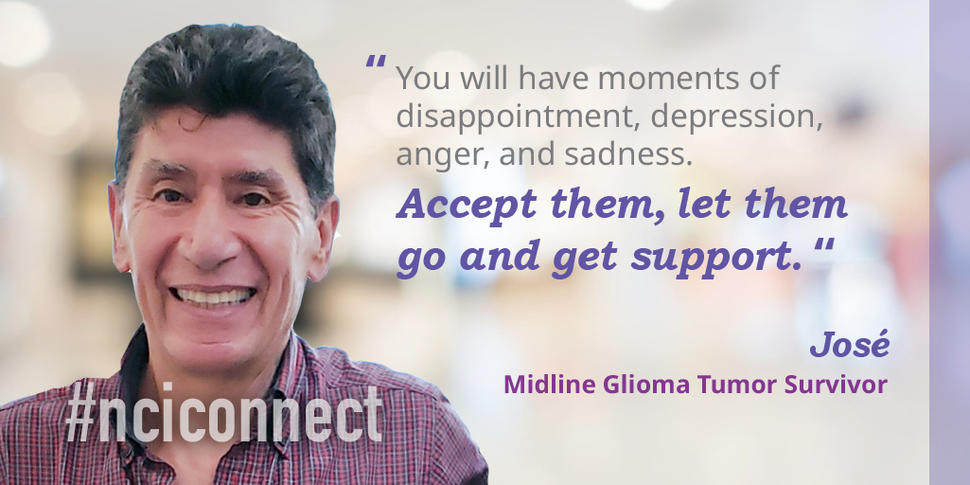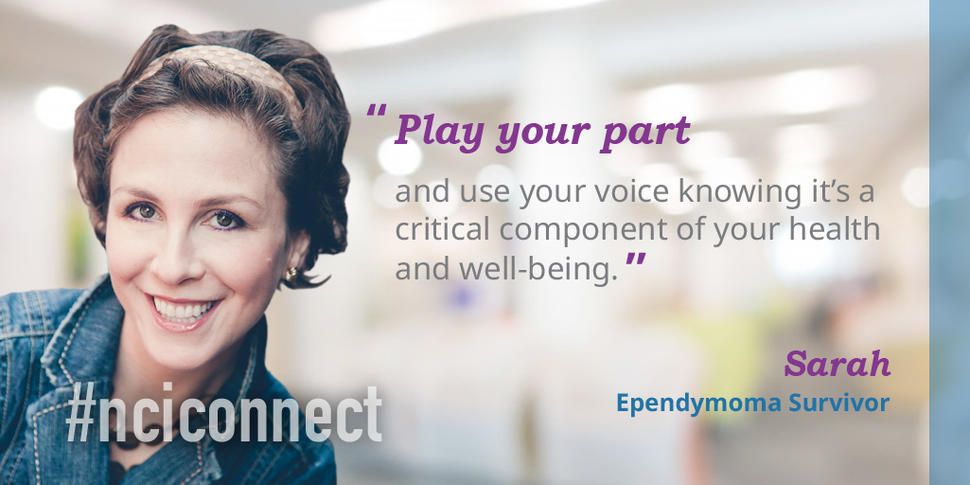Advice from the Brain Tumor Community
, by Kristin Odom, NCI-CONNECT Communications Editor
If you are newly diagnosed or living with a brain tumor, it can be hard to find support and resources. You may be unsure of your treatment plan, unable to find others to connect with, or you may feel emotionally drained.
To help guide you through your brain tumor journey, patients, caregivers, doctors, and advocates share their advice. Use their words and the resources listed to help you positively cope.
Talk to Others
“Talk to your family, your friends, or colleagues. Just talk about your diagnosis. It's so difficult and scary—don’t be alone in this.” – Anonymous, ependymoma survivor
“For months after surgery, I shut down mentally. Simple tasks like getting out of bed to brush my teeth or to take a shower were challenging. Talking with other patients helped me feel like I wasn’t alone. I also felt much more comfortable talking about my psychological and physical challenges with them rather than with my medical team—or even my parents—because I knew the other patients had experiences like mine. We could relate to each other.” – Dunamis, PNET survivor
“It is very important for caregivers to take care of themselves and share their own burdens . . . caregivers need care, too.” – Anonymous, Ependymoma Survivor
“Our program called ABTA CommYOUnity™ Connect provides one-on-one support to match patients, survivors, and caregivers with similar experiences and situations. We also have a brain tumor center listing and support group listing to help patients find the best care and support in their community.” – Nicole Willmarth, Ph.D., chief mission officer of the American Brain Tumor Association
Resource: NCI guide on relationships and communication with others >
Overcome the Physical Effects
“I use a cane to walk because I have numbness in both feet that goes all the way to my buttock on the right leg. I also have a dropped left foot. It is not easy, but I have adjusted my life accordingly. I face my challenges mindfully and am grateful for the good things life has given me.” – José, midline glioma survivor
“Expressing my thoughts verbally is not an easy task anymore. My solution to this inconvenience is to take breaks and rest my brain. Closing my eyes slows down my brain enough to catch up with my thoughts and words.” – Deborah, meningioma survivor
Resource: NCI guide on taking care of your physical health >
Embrace Your Feelings
“I don’t think there’s a way for others to really understand what something like this does to your life and outlook. The grieving process often begins at diagnosis. And going through the five stages of grief isn’t pretty—and I doubt I will ever get to acceptance. Over time, I have found it possible to be positive and continue to lead a full life, but there’s no escaping the sense of dread of the future.” – Brock, founder of Oligo Nation
“As you are in ‘the fog’ know that you will come out of it. It make take moments, days, months, and—for some—years. It’s OK. Pray and continue to live life fully.” - Anonymous, oligodendroglioma caregiver
“To cancel out negative feelings, I try to stay connected with family and friends, listen to music, go outside, bake, play with my, dogs, meditate, or write down three things I am grateful for every morning.” – Anonymous, glioblastoma caregiver
Resource: NCI guide to manage your emotions and feelings >
Partner with Your Medical Team
“A cancer diagnosis is life-changing for patients and their families, and we have the ability to help guide them.” – Marta Penas-Prado, M.D., NCI neuro-oncologist
“Ask your medical team or local health organizations about programs available near you. And explore the services your insurance provides, which could include learning and mobility devices.” – Stu, ependymoma survivor
“Your voice is the most powerful tool you own. It can be challenging to share your concerns in any situation, but particularly at times like these.” – Sarah, ependymoma survivor
“Stay informed. Doctors should speak to you in non-doctor language, so you understand your diagnosis and treatment options. If you don’t understand, ask questions.” – Ken, medulloblastoma survivor
Resource: NCI guide on communicating with your health care team >
Reflect on Your Values
“Take nothing for granted, enjoy every moment, every breath. Most importantly, don't sweat the small stuff. At the end of the day, it’s all small stuff. Focus on what is important to you and cherish it. Keep in mind, nobody knows when they are going to draw their final breath. We are just more fortunate to realize how delicate and fragile life is and how vulnerable we all are as humans, cancer or not.” – Anonymous, pineal region tumor survivor
“The difficulties of a brain tumor have caused me to reflect on some important aspects of my life. The uncertainty I face is prompting me to pursue my goals with some haste. I also think it makes me think clearly and effectively and refines my thoughts to have more value.” – Bob, oligodendroglioma survivor
Resource: NCI guide on spirituality, beliefs, and values >
Join our Facebook group or follow us on X (formerly Twitter) to hear more messages from our brain tumor community.

